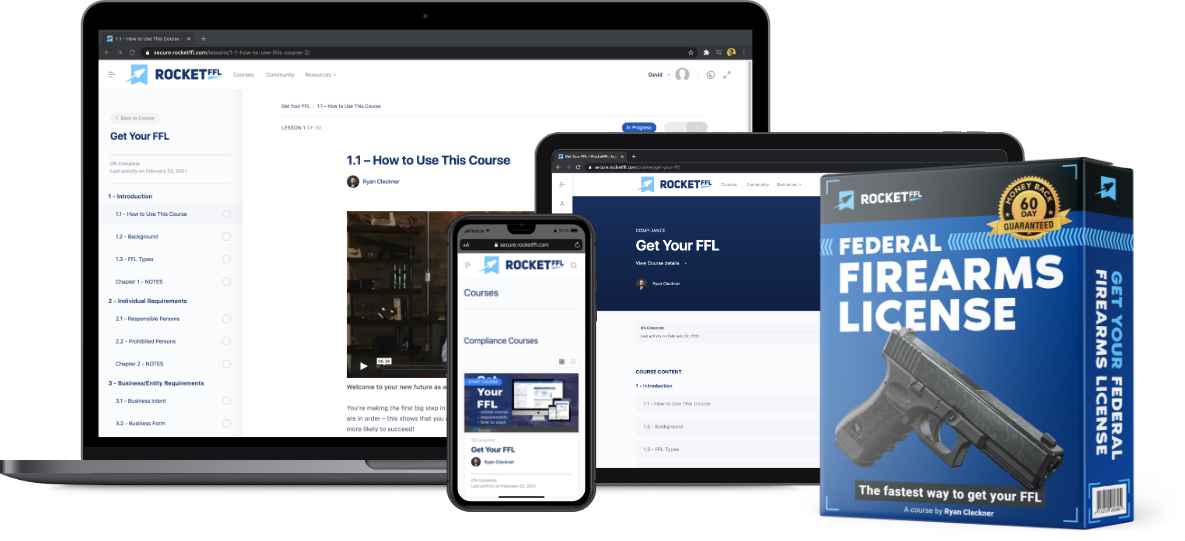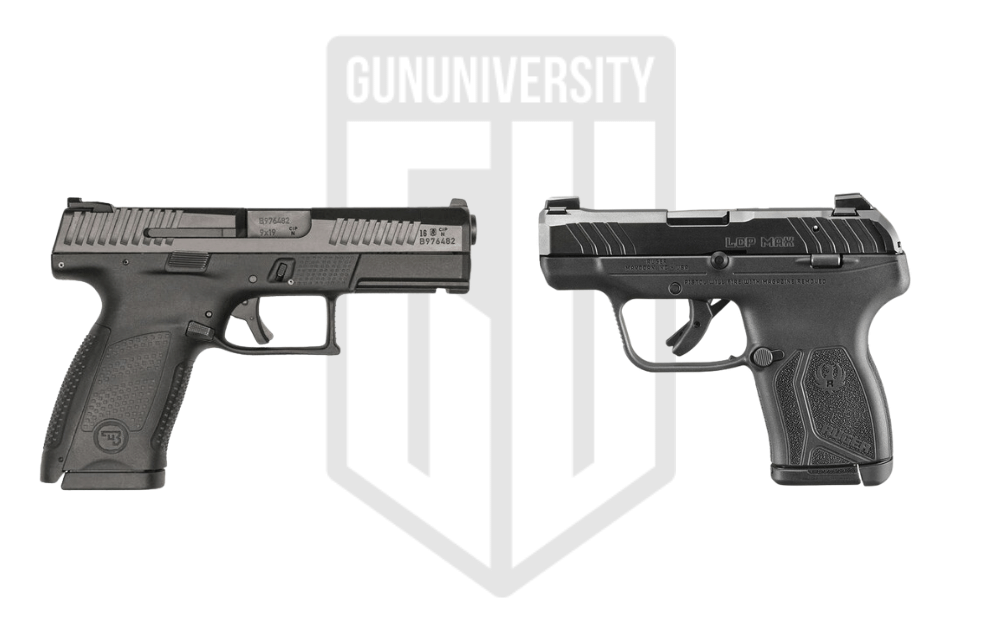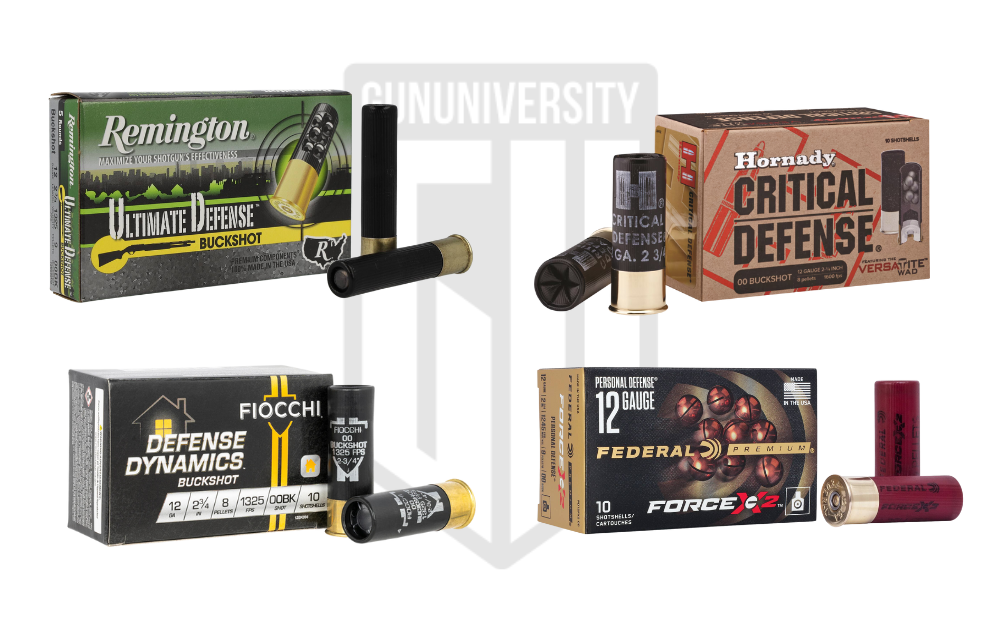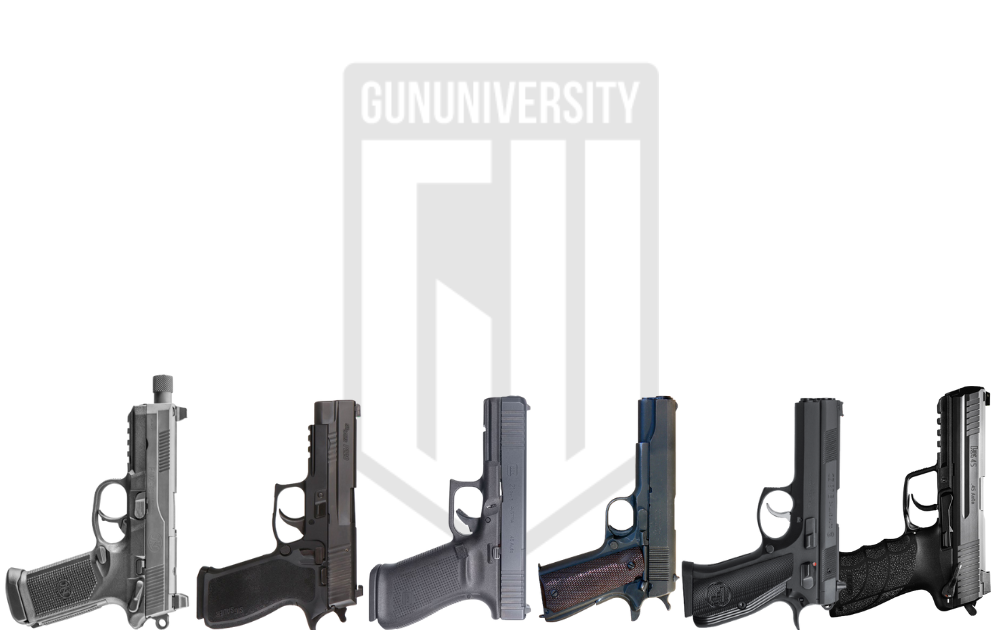How to Get an FFL Without a Business [Complete 2026 Guide]
If you’re going to get an FFL, it might be a good idea to start a formal business first, however, it is not necessary (if you do it the right way).
As a firearms attorney who’s helped thousands navigate the FFL process, I can tell you it’s entirely possible – and legal – to get an FFL without forming a business entity. And it’s easier than you might think.
I’m Ryan Cleckner, and I’m here to guide you through this step by step. We’ll clear up common misconceptions, explain what “business intent” means (don’t worry, it’s simpler than it sounds), and give you a clear roadmap to getting your FFL as an individual.
Basically, through the process I detail here, you’ll be able to get your FFL without having a business. But, as you’ll see, there are key steps you need to take in order to ensure your FFL application doesn’t get rejected.
And with that, let’s get started on your path to becoming an FFL holder – no formal business required.
In this article, you will learn:
- Advantages of taking an online FFL course before applying
- The difference between “business intent” and having a formal business entity
- Step-by-step process for obtaining an FFL without a business
- Common mistakes to avoid during the application process
- How to properly demonstrate business intent to the ATF
How to get an FFL Without a Business
Getting a federal firearms license without a business is a straightforward process when you know the right steps to take. Here’s a brief overview of what you need to do:
Step 1: Ensure You Meet the Requirements
Before you start your FFL application, you must make sure that you aren’t prohibited from getting an FFL license from the ATF.
Simply, if you can legally possess a firearm or ammunition, you qualify for an FFL. However, there are some other requirements that apply – you can learn more about those here: FFL requirements.
Step 2: Choose the Correct FFL Type
The type of FFL you need depends on the firearm-related activities you plan to conduct. For example:
- Type 1 FFL: For firearms dealers or gunsmiths (most common for home-based FFLs)
- Type 2 FFL: For pawnbrokers who deal in firearms
- Type 7 FFL: For manufacturing firearms for sale
For more details on choosing the right FFL type, read our article on FFL License Types.
Special Cases: Curio & Relics and NFA Firearms
It’s worth noting two special cases that have different requirements:
- Curio & Relics (C&R) Collectors: If you’re simply looking to collect Curio and Relic firearms, you only need a Curio & Relics FFL License (Type 03 FFL). Importantly, there is NO business intent requirement for this license, as it won’t allow you to be a dealer. This license is solely for collecting Curio and Relic (C&R) firearms.
- NFA Firearms: If you want to work with NFA firearms, such as silencers, suppressors, short-barreled rifles (SBRs), machine guns, and other regulated items, you’ll need to become a Special Occupational Taxpayer (SOT), sometimes called a Class 3 license. This is in addition to your regular FFL.
Step 3: Take an Online FFL Course
While it’s possible to fill out the FFL application forms yourself, I highly recommend taking the Rocket FFL Course. For just $50, you can save yourself from major headaches and potential application delays or denials.
The course will guide you through:
- Properly filling out all required forms
- Understanding and meeting all legal requirements
- Avoiding common mistakes that lead to application denials
- Preparing for your interview with the ATF
Basically, without a course like this, your chances of getting your application rejected (and your price for FFL submission lost) increase dramatically. So, save yourself the money and the headache, and watch over my shoulder as I walk you through each step to applying for your FFL.
Step 4 – Submit FFL Application
Once you’re confident that you’ve set everything up correctly, submit your FFL application (ATF Form 7) along with the required fee to the ATF. They’ll conduct a background check and, if everything is in order, issue your FFL.
Remember to send your application, photo, and fingerprint card to both the ATF’s federal firearms licensing center and your local law enforcement agency.
Looking for more detailed info? Check out our article How to Get an FFL.
“Business Intent” vs FFL Business
This is a crucial distinction that often trips up FFL applicants. The ATF requires that your FFL license is not solely for personal use. While you don’t need a formal business entity, you must demonstrate a clear intention to engage in some form of firearms-related business activity.
The ATF has outlined business intent requirements – I recommend you check these out.
Many applicants fail at this stage because they don’t properly express their intentions that include business intent. Here are some ways to demonstrate business intent:
- Plan to charge for firearms transfers
- Intend to buy firearms at dealer cost and sell them for a small profit
- Offer gunsmithing or firearm customization services
During your initial meeting with the ATF Industry Operations Investigator, be prepared to discuss your business plans clearly and confidently.
Remember, while getting an FFL without a business is entirely possible, it’s crucial to understand all the requirements and potential pitfalls. Consider taking the Rocket FFL Course for comprehensive guidance through the application process.
Home Based FFL
You don’t need an actual gun shop in order to be an FFL gun dealer. As long as it ins’t prohibited by local law, you can be a home based FFL.
In fact, the majority of FFLs in this country are currently home based.
With a home based FFL you can still conduct a retail firearm sale but you might need to do them as online gun sales if you’re not allowed to have retail foot traffic due to zoning issues.
As a licensed dealer operating form home, most people satisfy the business intent requirement by charging for a firearm transfer.
Starting a Business for Your FFL
Although a business is not required for getting a federal firearm license from the ATF, you may choose to start a business anyway (there are some really good reasons for this covered in the RocketFFL course).
If you’d like to start a business, you’ll need to determine which business type you’d like to operate (e.g. an LLC or Corporation), establish the business entity, apply for an EIN with the IRS, and register the business with your state.
It’s not as hard as it sounds and the RocketFFL course covers all of this for you
FFL Business Requirements
There are some requirements for a business if you choose to have one for your FFL.
For example, the business must be registered in your state (you need a business license), the business name needs to be on the FFL application to the ATF, and the business MUST be properly formed with all ownership disclosed to the ATF.
If this interests you, you really should go start the FFL process now – if you start today, in 2 months from now, you could have your FFL.
Business Requirements for NFA Firearms
Standard firearms are covered under Title 1 of federal firearms law: the Gun Control Act. These firearms are sometimes called Title 1 firearms.
NFA firearms, however, are covered under Title 2 of United States firearms laws, the National Firearms Act.
It is still not required to have a registered “business” to deal in or make an NFA item.
In fact, you can make an NFA firearm as an individual (without an FFL) through a Form 1.
FFL Business FAQ
No, you do not need a formal business entity to get an FFL. You can apply as an individual (sole proprietor). However, you must demonstrate “business intent,” which means you plan to engage in some firearms-related business activity.
You can get an FFL in your name as an individual instead of using a business entity. Follow these steps:
– Ensure you meet the FFL requirements
– Choose the correct FFL type
– Take an online FFL course (recommended)
– Submit your FFL application (ATF Form 7)
– Pass the ATF interview and background check
No, an FFL costs the same (for each particular FFL type) regardless of whether a business is used. Fees range from $30 to $200 for a three-year license, depending on the type of FFL.
No, an FFL is not needed to sell ammunition. However, if you want to manufacture ammunition for sale, you’ll need an FFL.
No, you don’t need to register a business name if you’re applying as an individual (sole proprietor). However, your state may require you to register as a sole proprietor for tax purposes.
Yes, you can use your FFL to acquire firearms for personal use. However, this cannot be the sole purpose of your FFL. You must demonstrate an intent to conduct some form of firearms-related business.
Yes, you can become an SOT as an individual FFL holder. However, there are important considerations regarding how you register. It’s highly recommended to seek professional guidance or take a comprehensive course like Rocket FFL before pursuing this option.
Yes, you can operate a home-based FFL as long as it’s not prohibited by local zoning laws. Many FFLs operate from home, often conducting business through online transactions if local regulations restrict foot traffic.
Recent Posts
February 21, 2026
February 21, 2026
February 21, 2026
February 20, 2026






Can I have a FFL 03 for myself and a FFL 01 as a business at the same time?
Your articles are clear, and well written. Thank you.
An odd question, if you have time: when interpreting the phrase “business intent”, does ATF (as part of Treasury) use similar reasoning and considerations as IRS, or are they using materially different criteria?
Different criteria (also ATF is no longer part of treasury).
Can you buy and sell ammo in California with a type 01 FFL?
To have ammo delivered to my house, the company,in California, requires a FFL #.
Thanks!
So as a private individual can I apply for a FFL 01 to purchase firearms for myself?
I’m a military surplus (Milsurps) weapons collector. While I can use a FFL 03 (C&R) to purchase some weapons, some online dealers are being overly careful now (Can’t blame them for being cautious). I’ve found several antique (Pre 1899, and don’t require a AFT 4473/background check) along with C&R (FFL 03) eligible milsurps for sale online and the dealer/seller requires them to be sent to a FFL 01 for transfer. Granted there are some milsurps or mil type weapons that require the use of a FFL 01.
So I’m spending a lot on having antique and C&R weapons sent to a FFL 01 for background checks (4473) and transfer fees. With some local FFLs charging up to $100.00 plus between a convenience fee and transfer fee. My go to FFL retired and most of the current local FFLs are difficult to work with when it comes to wanting to use them as a go between, between me and an online vendor or private seller.